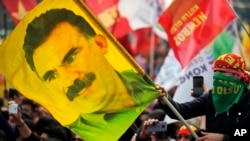Imprisoned Kurdish leader Abdullah Ocalan called on his militant group on Thursday to lay down its arms and dissolve as part of a new bid to end a four-decade long conflict that has claimed tens of thousands of lives.
In a message from his prison on an island off Istanbul on Thursday, Ocalan said the Kurdistan Workers' Party, or PKK, should hold a congress and decide to disband.
"Convene your congress and make a decision. All groups must lay their arms and the PKK must dissolve itself," Ocalan said, according to a message that was relayed by pro-Kurdish party politicians who visited Ocalan earlier in the day.
Ocalan's momentous announcement is part of a new effort for peace between the group and the Turkish state, that was initiated in October by President Recep Tayyip Erdogan's coalition partner, Devlet Bahceli. The far-right politician suggested Ocalan could be granted parole if his group renounces violence and disbands.
Ocalan, 75, has been imprisoned on the island of Imrali, off Istanbul, since 1999 after being convicted of treason. Despite his incarceration, he continues to wield significant influence over the PKK. The group's leadership is widely expected to heed any call Ocalan makes, although some factions within the group could resist, analysts say.
The peace effort comes at a time when Erdogan may need support from the DEM party in parliament to enact a new constitution that could allow him to stay in power.
The Turkish Constitution doesn't allow Erdogan, who has been in power since 2003 as prime minister and later as president, to run for office again unless an early election is called — something that would also require the support of the pro-Kurdish party.
The DEM party has long pressed for greater democracy in Turkey and rights for the country's Kurdish population, and also to improve conditions for the imprisoned Ocalan.
Founded by Ocalan in 1978, the PKK has led an insurgency in Turkey's southeast since 1984. The group is considered a terrorist organization by Turkey and its Western allies. Previous peace efforts with the PKK have ended with failure — the most recent in 2015.
Even amid the latest peace efforts, Erdogan's government has widened a crackdown on the opposition, arresting journalists and politicians. Several elected Kurdish mayors have been ousted from office and replaced with state-appointed officials.
Thursday's meeting was the third time DEM party officials have met with Ocalan as part of the peace efforts. The officials have also met with Selahattin Demirtas, an imprisoned former pro-Kurdish party leader, and traveled to Iraq for talks with Kurdish leaders there.




